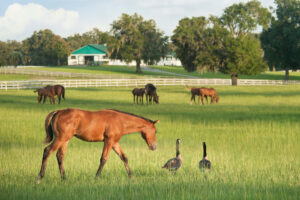Responsible Horse Ownership
Animal rights, owner responsibility, health and welfare, and all the attendant issues occupy more and more of our time and energy these days as we horse owners struggle to find a place in our busy lives for what once was a routine part of life in a long-ago society. Now, a few generations removed from our agrarian roots, we are bombarded, it seems, with ethical and political questions unasked
- Topics: Article
Animal rights, owner responsibility, health and welfare, and all the attendant issues occupy more and more of our time and energy these days as we horse owners struggle to find a place in our busy lives for what once was a routine part of life in a long-ago society. Now, a few generations removed from our agrarian roots, we are bombarded, it seems, with ethical and political questions unasked generations ago. Do horses have rights? Do we have responsibilities to them? Can we “use” animals for recreation now that our world doesn’t move on horseback? Who decides the standards of care? Who says we can’t keep a horse in a suburb? Why can’t we let the mustangs run free?
Individually, once we own a horse (assuming that one can), what is our responsibility beyond his immediate health and care? Is it “for life,” or only as long as we are interested? And what do we do if he’s lame and isn’t going to get better? And how old is too old?
As a life-long horse owner and a career veterinarian, I’d have answered each of these questions differently at different times of my life. It used to be that auctions were a real part of “Americana,” a place where a rural kid with no money could pick up a good, young, clean-legged prospect for less than a week’s pay, put some training on him, then bring him back six months later and make a few bucks for his efforts. Now, it’s a battleground for the killer buyers and the hustlers who try to make a few quick bucks and move along. Free running mustangs are starving even as we speak due to over-population and over-grazing in areas that are in the midst of “100-year droughts.” They are the victims in many cases of well-meaning legislation, poorly implemented and stifled in many cases by “advocates” stuck in 19th Century visions of unfenced prairies and unpopulated spaces that are no longer “wide open.”
So, responsible horse ownership can mean many things to many people. The only answer is, of course, education and concern. Educate yourself about the animal you love and provide for his health and welfare. There are many opportunities presented daily (you’re reading this, aren’t you?). Then educate yourself about the issues–first local ones, like zoning and standards of care for your climate and locale–then tackle the bigger ones we’ve already mentioned. Horses the world over need advocates, whether they’re carrying bananas, tourists, or eventers. And they need commitment. Since the auctions have changed, make sure your once-useful pet doesn’t go there. There are retirement ranches springing up all over the country, but only a few are regulated, and standards of care are variable
Create a free account with TheHorse.com to view this content.
TheHorse.com is home to thousands of free articles about horse health care. In order to access some of our exclusive free content, you must be signed into TheHorse.com.
Start your free account today!
Already have an account?
and continue reading.
Related Articles
Stay on top of the most recent Horse Health news with

















